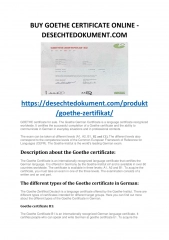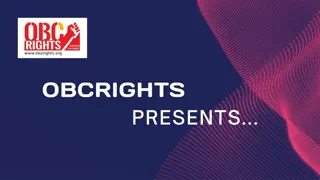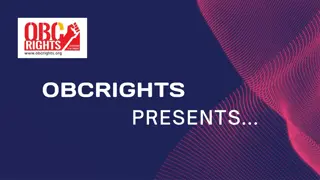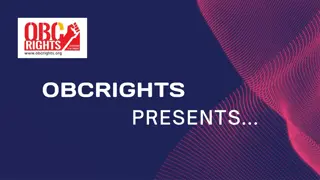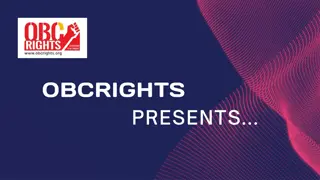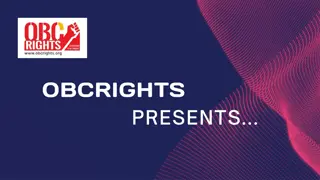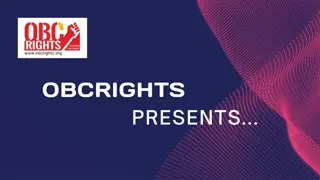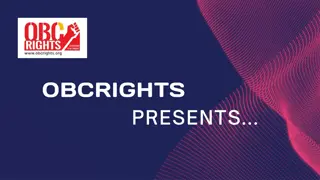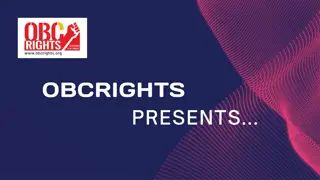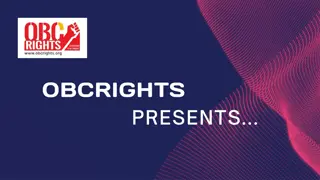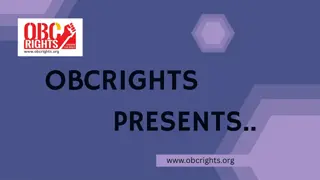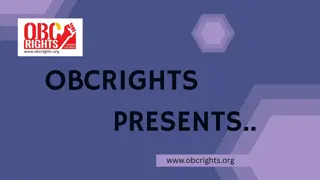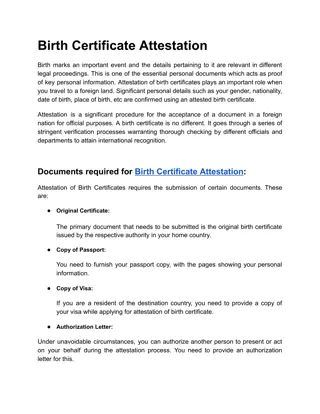Proposed Senior Secondary Certificate Reform Curriculum Consultation for Vocational Specialisation
A new curriculum is being proposed for vocational specialisation in senior secondary certificates in Victoria. The curriculum focuses on providing flexible pathways for students with standards-based assessments, offering courses aligned with students' needs and aspirations. Feedback on the draft curriculum is sought through a consultation process, with a timeline closing in September 12, 2021. The curriculum aims to enhance student engagement and self-efficacy while maintaining relevance to their futures. Implementation is expected from 2023 onwards.
Download Presentation

Please find below an Image/Link to download the presentation.
The content on the website is provided AS IS for your information and personal use only. It may not be sold, licensed, or shared on other websites without obtaining consent from the author.If you encounter any issues during the download, it is possible that the publisher has removed the file from their server.
You are allowed to download the files provided on this website for personal or commercial use, subject to the condition that they are used lawfully. All files are the property of their respective owners.
The content on the website is provided AS IS for your information and personal use only. It may not be sold, licensed, or shared on other websites without obtaining consent from the author.
E N D
Presentation Transcript
Senior Secondary Certificate Reform Curriculum consultation Vocational specialisation
Certificates in Victoria Foundation Pathways Certificate AQF level 1 Standards based Highly flexible Vocational Specialisation in the VCE AQF Level 2-3 Standards based Flexible VCE AQF Level 2-4 Standards and examinations Structured Students, parents and schools choose in partnership most appropriate course student need, aspiration and capability Standards based courses teachers assess whether a student meets the standards in the curriculum documents. Students receive an S or N result. Enhanced statement of results what they know and can do, have achieved.
Our hopes for this curriculum Students engaging in the learning Importance / relevance about them and their futures Self efficacy /achievable teach at different levels for success /flexible Emotional response feel intrigued / curious/ excited / control /anxious Marzano the Self System Effect size .74 / 27pp
New curriculum ready for feedback Based on the VCAL strands Developed by teams of teachers lead by our curriculum team Tested already with a range of targeted consultation, both within and outside VCAA Best of the old supplemented by new material Four curriculum documents: Literacy 1 4 Numeracy 1 4 Personal Development Skills 1 4 Work Related Skills 1 4.
Draft Vocational specialisation* structure Students will undertake 16 22 units. This can include credit at Units 1 & 2 for Structured Workplace learning recognition Minimum requirement for satisfactory completion: 16 units, which must include: 3 units of Literacy or VCE English, including a 3 4 sequence 2 units of Numeracy or VCE Mathematics 2 units of Work Related Skills 2 units of Personal Development Skills 2 credits of VET at Certificate II level or above. Students will be required to complete a total of 8 units at Units 3 4 level. *to be renamed
Consultation timeline Consultation closes midnight Sunday 12 September. Accessed via VCAA website: www.vcaa.vic.edu.au/victorianseniorsecondarycertificatereform/Pa ges/Index.aspx Final curriculum published early 2022 Implementation from 2023.
Vocational specialisation study designs VCE study design format (as they will be a program within VCE) Format familiar to those who have worked with VCE: Introduction, scope of study, rationale and aims Units, areas of study, outcomes, key knowledge and key skills (new) Evidence for Assessment Four-unit structure Minimum of 50 hours of scheduled class time per unit Units 1 and 2 provide a progression to Units 3 and 4.
Implementation support and resources Advice for Teachers will be published Will include case studies and examples, particularly of ways to integrate units Professional learning program in 2022 Regional and metropolitan areas/cross sectoral Enhanced quality assurance/audit program.
Numeracy Aims Students will: develop and enhance numeracy practices to help make sense of personal, public and vocational lives develop mathematical skills with consideration of local, national and global environments and contexts, and an awareness and use of appropriate technologies
Numeracy each unit has 3 Outcomes Outcome 2 Problem Solving Outcome 1 Outcome 3 Tool kit
Outcome 1 is framed around six different numeracies: a) Personal numeracy b) Civic numeracy c) Financial numeracy d) Health numeracy e) Vocational numeracy f) Recreational numeracy. 1. Eight areas of study name and describe a range of different mathematical knowledge and skills that are expected to be used and applied across the three outcomes
Literacy Aims Students will: develop the knowledge and skills required in order to be confident users of written and oral communication understand that different audiences require different types of language develop the knowledge and skills required to be able to produce a range of workplace documentation have the confidence to present ideas in a thoughtful and reasoned manner
Literacy: Units 14 Unit 1 Unit 2 Literacy for personal use Understanding and creating digital texts Understanding the language of public debate Responding to opinions Unit 3 Unit 4 Accessing and understanding specialised texts Creating and responding to specialised texts Understanding and engaging with literacy for persuasion and promotion Speaking to advise or advocate: Option 1: Literacy for civic participation Option2: Literacy for everyday personal contexts
Personal Development Skills Aims Students will: develop a sense of identity and self-worth access, critique, synthesise and communicate reliable information practise the rights and responsibilities of belonging to a community recognise and describe the attributes of effective leaders work independently and as part of a team to understand and respond to community issues develop capacities to participate in society as active, engaged and informed citizens.
Personal Development Skills: Units 14 Unit 1 Unit 2 Healthy individual Connecting with community What is community Community cohesion Community support Identity and Self-care Health in action Social media and communication Unit 3 Unit 4 Leadership and goal achievement Self-management for goal achievement Effective leadership Leadership and collaboration Researching a community issue Plan and initiate a response to community issue Communicate and evaluate the project
Work Related Skills Aims Students will: understand and apply concepts and terminology related to the workplace understand the complex and the rapidly changing world of work and workplace environments understand the relationship between skills, knowledge, capabilities and attributes, and the achievement of pathway goals develop effective communication skills to enable self-reflection and self-promotion practically apply skills and knowledge.
Work Related Skills: Units 14 Unit 1 Unit 2 Careers and Learning for the Future Future careers Presentation of career and education goals Workplace Skills and Capabilities Skills and capabilities for employment and further education Transferable skills and capabilities Unit 3 Unit 4 Industrial Relations, Workplace Environment and Practice Workplace wellbeing and personal accountability Workplace responsibilities and rights Portfolio Preparation and Presentation Portfolio development Portfolio presentation



